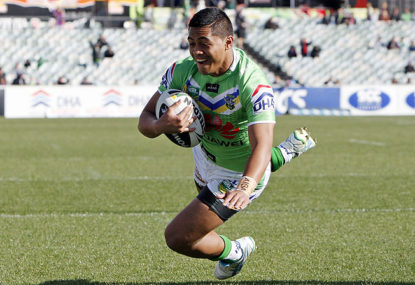2013 was the year that the NRL became a billion-dollar industry. Signing a massive television rights deal with commercial providers Channel Nine and Fox Sports, the NRL ensured the financial future of the code.
A significant revenue-booster, it subsequently lead to clashes between the NRL and the Rugby League Players Association over potential salary cap increases.
Despite the media attention devoted in the off-season to the cap conflict, another significant issue arose later in the season regarding the sanctity of contracts. With players and coaches departing to preferable situations, it has increased the scrutiny on the complicated contract situation that the NRL finds itself in.
The three main examples of contract disputes in 2013 relate to players Ben Barba, Anthony Milford and coach Ricky Stuart. Stuart’s situation differs from the players in that he had an early termination clause inserted in his contract.
Though there are interesting questions in relation to the existence of such clauses, there is no doubt that he was within his contractual rights to end his obligation to the Parramatta Eels.
However, the player situations are far more complicated, as the contracts don’t feature early termination clauses.
Though Barba had two years remaining on his Bulldogs contract, he continually expressed his desire to leave the club for Queensland.
Canterbury was under no obligation to release Barba, yet did based upon compassionate grounds.
Barba was able to move closer to his family but also received a new deal with Brisbane.
Despite the existence of his Canterbury contract, Barba had little trouble receiving his release by appealing for compassionate grounds.
Anthony Milford has not yet been released from his contract but continues to argue on compassionate grounds.
With manager Sam Ayoub, he has experienced a tough negotiation with Canberra who remain unwilling to accept his potential departure.
Even though the Raiders retain Milford’s playing contract, Ayoub has threatened legal action and a boycott of the 2014 season.
Despite a contract existing between the two parties, which has no definitive language allowing for a release, Milford and his agent appear to expect Canberra to provide a release despite there being no official obligation to do so.
It is in the Raiders’ interest to stand firm, as they have the legal right to do under their two-party contract.
Though both players have real off-field issues to deal with, their release on compassionate grounds sets a dangerous precedent for the future of NRL contracts.
It raises the possibility that players will argue for contract terminations, using illegitimate compassionate situations as a legitimate reason.
If a club refuses to meet the demands of these players, they run the risk of further vilification for failing to meet the emotional needs of players.
The potential for players to take advantage of the compassionate grounds precedent is unfair to clubs as well as other players who have legitimate emotional issues.
What must also be considered is the change in on-field performance for teams affected by these contract terminations.
The Bulldogs have lost a top level fullback, though he may eventually be replaced by Josh Hoffman.
For their integrity in accepting compassionate reasons for termination, their starting squad will be notably weaker in the 2014 NRL season.
The Raiders have potentially lost one of the league’s top rookies, depending on the final outcome of the Milford contract negotiation.
Though players have the right to ask for leave on compassionate grounds, there is a question of whether they should be provided with the right to instantly continue their career with another NRL team.
The expectation that because they have shown compassionate grounds means the team should release control of their playing career places an unfair onus on NRL clubs.
Essentially, the strength of contracts has been effectively diminished in 2013 as players have been able to challenge contracts despite years remaining on their individual deals.
This emerging grey area places the NRL in a dangerous ethical situation. It isn’t yet in position to dictate which situations are deserving of compassionate grounds and a complicated precedent is quickly arising.
The threat of compassionate grounds being violated by players and player-agents is real in nature and the NRL has to ensure the sanctity of player contracts.
There is no clear solution to this dilemma but nevertheless, the NRL must act decisively to stabilise the contract situation within the league.





























































































